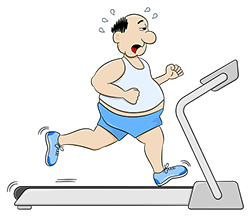What's
Inside
The Exercise Paradox
Does Exercise Have Little
to Do With Weight Loss?
Why don't the hours we spend on a treadmill result in pounds lost? Wisdom holds that physically active people burn more calories than less active people do. But studies show that hunter-gathers, who lead physically hard lives, burn the same number of calories as overweight Westerners.
 Many of us feel exercise is a time-consuming, unpleasant chore, and we dread it. The need to change into other clothes, to frequently take a block of time out of our busy lives, and to get dirty and fatigued: many of us find it all unappealing. Plus, many of us lack the energy to even think about the possibility of exercise.
Many of us feel exercise is a time-consuming, unpleasant chore, and we dread it. The need to change into other clothes, to frequently take a block of time out of our busy lives, and to get dirty and fatigued: many of us find it all unappealing. Plus, many of us lack the energy to even think about the possibility of exercise.
Yet, we believe in order to lose excess body fat we need to engage in strenuous exercise to burn off calories. We intuitively think that cutting back on calories and exercising off hard-to-burn calories is the key to weight loss. Calories in, calories out, right? Wrong. Or, at least, not entirely right.
We All Burn the Same Number of Calories Regardless of Our Activity Level
In breakthrough research anthropologist Herman Pontzer, PhD describes a surprising and fascinating discovery that overturns our assumptions about fat loss and exercise: humans burn about the same number of calories regardless of activity level.
 This doesn't mean that we should eschew exercise or eliminate it as part of our health and fitness lifestyle. Regular activity does help our body's systems function optimally and it elevates our mood and improves our thinking. But is exercise a key factor in helping us lose weight regardless of diet? Not so much.
This doesn't mean that we should eschew exercise or eliminate it as part of our health and fitness lifestyle. Regular activity does help our body's systems function optimally and it elevates our mood and improves our thinking. But is exercise a key factor in helping us lose weight regardless of diet? Not so much.
Do Hunter-Gatherers Expend Burn More Calories Than Sedentary Overweight People?
In the study, "Hunter-Gatherer Energetics and Human Obesity," Pontzer focused on the daily energy expenditure, physical activity level and diet in Hadza foragers to test the hypothesis that hunter-gatherers expend more energy each day than sedentary and overweight people living in the Western world.
Ate Wild foods: Tubers, Berries, Small and Large-Game, Baobab Fruit, and Honey. All Had Low But Healthy Levels of Body Fat
 The Hadza are a population of hunter-gatherers living in a savannah-woodland environment in Northern Tanzania. The Hadza hunt and gather on foot with bows, small axes, and digging sticks, without the aid of modern tools or equipment. Hadza men hunt game and gather honey while Hadza women gather plant foods.
The Hadza are a population of hunter-gatherers living in a savannah-woodland environment in Northern Tanzania. The Hadza hunt and gather on foot with bows, small axes, and digging sticks, without the aid of modern tools or equipment. Hadza men hunt game and gather honey while Hadza women gather plant foods.
Over 95% of Hadza calories come from wild foods, including tubers, berries, small-and large-game, baobab fruit, and honey. All of the Hazda tribe members had low, but healthy, levels of body fat.
The researchers compared the energy expenditure among the Hadza to that of sedentary and overweight U.S. and European adults.
 Given the Hadza's physically active lifestyle, the researchers expected the Hadza, with their natural diet and lack of mechanization, should expend more energy than U.S. and European adults with comparatively sedentary lifestyles and highly-processed, sugar-rich diets.
Given the Hadza's physically active lifestyle, the researchers expected the Hadza, with their natural diet and lack of mechanization, should expend more energy than U.S. and European adults with comparatively sedentary lifestyles and highly-processed, sugar-rich diets.
Hadza's Energy Expenditure No Different Than That of Sedentary, Overweight Westerners
Though physical activity level was greater among Hadza foragers than among Westerners, the Hadza's average daily energy expenditure was no different than that of Westerners. Hadza men expended on average 2,600 calories a day while Hadza women expended 1,9000 calories. Sedentary and overweight Western men and women expend almost the same amount of daily calories as the Hadza.
This similarity in energy expenditure between the Hadza and Western populations is counterintuitive given the Hadza’s physically active lifestyle. These findings challenge the view that he Western sedentary lifestyle results in an abnormally low amount of calories being burned and that this decreased calorie expenditure is a primary cause of obesity.
Expenditure of Calories Through Exercise
May Not Protect Against Obesity
Sugar-Rich Diet vs Complex Carbs & Lean Meat is the Difference
The primary difference between the the lean-bodied Hadza and obese Westerners is diet and not energy expenditure through exercise. The Western diet, rich in highly-processed, energy-dense but nutrient-poor foods (sugar), is the primary cause of obesity.
 A refined carbohydrate (sugar-rich) diet, versus the hunting and foraging diet of the Hadza's, increases the accumulation of excess body fat and associated metabolic complications such as insulin resistance. Insulin resistance leads to conversion of ingested sugar into fat and to the storage and accumulation of that fat around the stomach, waist and buttocks.
A refined carbohydrate (sugar-rich) diet, versus the hunting and foraging diet of the Hadza's, increases the accumulation of excess body fat and associated metabolic complications such as insulin resistance. Insulin resistance leads to conversion of ingested sugar into fat and to the storage and accumulation of that fat around the stomach, waist and buttocks.
Key to Leanness: Derive Energy Primarily from Stored and Ingested Fat, Complex Carbs Instead of Refined-Sugars
This study suggests the Hadza derive their energy primarily from the burning fat stores instead of sugar stores since very little sugar is available in the hunter-gather diet — with the exception of honey. This keeps the Hadza body fat composition lean.
The Western dependence on sugar as the primary source of energy oftentimes results in sugar dependence and addiction which further compounds the obesity problem. This puts overweight people into a downward spiral of increased fat accumulation, desperation, depression and even a loss of hope.
The key to effective and lasting fat loss is to wean our diet
off of sugar and replace it with complex carbohydrates and lean proteins similar to the Hadza diet. This enables our metabolism to transition from a sugar-burning/fat-storing one to one with metabolic pathways that burn excess body fat as the primary source of energy.
Moderate Exercise Healthy & Produces Fat Burning Enzymes
Again, this study does not discourage exercise as part of a lean and healthy lifestyle. Exercise, such as  walking, helps develop lean muscle tissue in the lower extremities. Lean muscle tissue produces fat burning enzymes that act as catalysts in the burning of body fat for energy. Exercise also fortifies the body's immune system, elevates our mood and thinking abilities.
walking, helps develop lean muscle tissue in the lower extremities. Lean muscle tissue produces fat burning enzymes that act as catalysts in the burning of body fat for energy. Exercise also fortifies the body's immune system, elevates our mood and thinking abilities.
Healthy Eating is King When It Comes to Fat Loss
Yet, if one were to ask, what is more important to weight loss, diet or exercise? The Hadza study seems to indicate that dietary practice is king.
The dietary principles found in "The New Neuropsychology of Weight Control" promote the successful transition from a sugar-burning to a fat-burning metabolism and thus the development of a lean, healthy body.


Beside dietary and physiological factors that effect how much fat your body stores your body fat is also influenced by the image your hold in you mind's eye bout your body. If you perceive ourself as obese and hold negative feelings about your body, your body's chemistry and metabolism will work to defend what that image represents. Changing your body is just not following correct dietary and exercise principles. You also have to change and restructure your body image and how you feel about your body.
